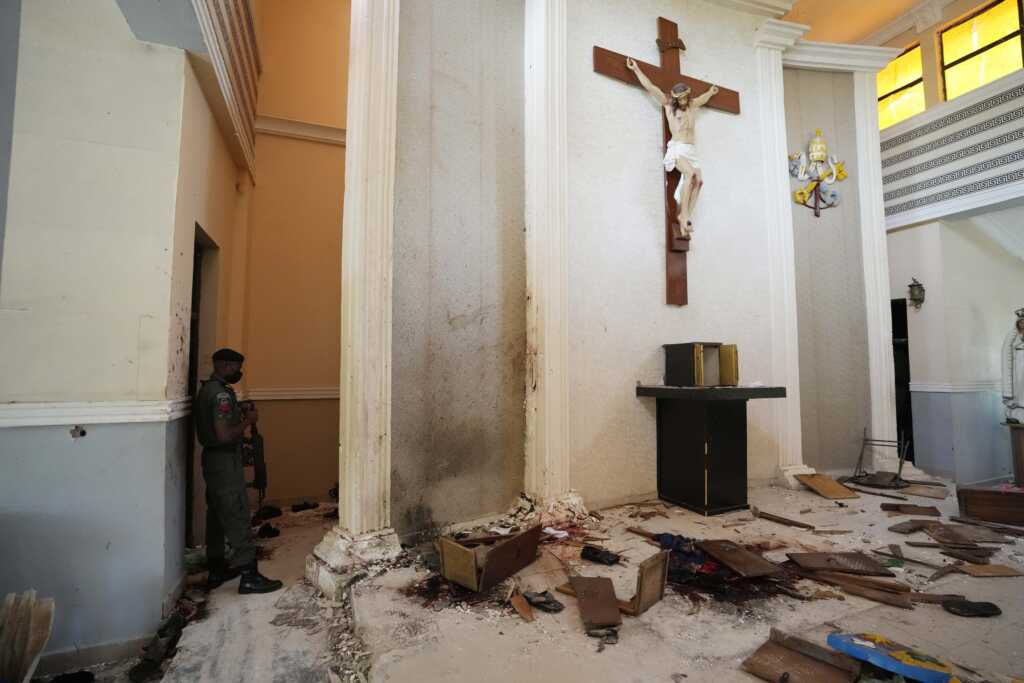With horrific headlines continuing to come from Nigeria, a persecution watchdog is warning “all of the indicators are negative” as the situation devolves.
Listen to the latest episode of CBN’s Quick Start podcast 👇
Joel Veldkamp, head of international communications at Christian Solidarity International (CSI), told CBN’s Faithwire a recent election in Nigeria is just one of the signs the circumstances are crumbling.
“Nigeria became a democracy in the year 2000, after many decades of military rule by northern Muslim military rulers,” he said. “And when they made the transition to democracy, they had kind of an informal custom that, if the president was a Christian, the vice president would be a Muslim, and if the president was a Muslim, the vice president would be a Christian.”
Likewise, if there was a Christian president, the one who followed would generally be a Muslim and vice-versa — a system bent on attempting to ensure all people in the country had representation.
“This was not written down anywhere, but this was just kind of a tradition that everyone understood, and everyone honored,” Veldkamp said.
Watch him explain the issues unfolding in Nigeria:
But now Veldkamp said the nation is coming off eight years of having a Muslim president, and the most recent election in March saw a Muslim come into both the presidential and vice presidential positions.
While political parties traditionally pair a Christian and Muslim for the presidential and vice presidential tickets, Bola Tinubu of the All Progressive Congress Party, who won Nigeria’s February election, was part of an all-Islamic pairing; he ran alongside Sen. Kashim Shettima.
“The Nigerian political establishment has completely thrown this arrangement out the window at a time when violence against Christians in Nigeria has never been higher when Christians in Nigeria’s Middle Belt region are being systematically driven out of their villages,” he said. “The month after the election saw something like 130 Christian villagers killed in a state called Kaduna, which is really on the front lines of all this fighting, so all of the indicators are negative right now.”
Veldkamp said it will take time for Christians in the southern region of Nigeria to feel the full impact of what’s unfolding, though the current events in the Middle Belt are quickly exacerbating.
“I can very well see an acceleration of attacks on Christian villages [to] the point where it becomes impossible for Christians to live there,” he said. “And this place that used to be home to hundreds of different Christian groups is just 100% Muslim, and all of these people have been internally displaced. They’ve lost their homes. They’ve lost their homeland.”
Veldkamp said once the Middle Belt goes, it will mean two of Nigeria’s three big regions will be “controlled by Muslim elites.”
“The Christians in the south are going to find themselves very lonely in this new political arrangement,” he said.
As CBN’s Faithwire has reported, the situation inside Nigeria is grim. Yet, the Biden administration again declined in December to add Nigeria to the U.S. Department of State’s Countries of Particular Concern list, a designation targeting nations restricting or complicit in religious freedom violations.
The Trump administration had previously placed Nigeria on the list in 2020 before the Biden administration removed the nation. The recent decision to keep Nigeria off the list has riled religious freedom advocates frustrated by the U.S. government’s approach.
In December, Veldkamp shared some of the stories unfolding inside the region, revealing conversations with priests in Nigeria who witnessed and experienced the unthinkable.
“Earlier in the week, I had talked to two different priests from two different states in Nigeria,” he said at the time. “One is in the middle of the country, and one is in the deep south of the country. One priest… had just visited a village where 20 Christians were killed the week before. He met a father who saw four of his children killed in front of his eyes.”
This same priest met another mother and father who lost one of their children and saw homes being burned to the ground. One of those interview subjects somberly said, “I stood on the ashes of human beings.”
The second priest came from the deep south of Nigeria, where Christians had been, until recently, “relatively safe,” according to Veldkamp.
But that priest witnessed a massive attack on his village by the Fulani ethnic group, leaving around 12 dead. The faith leader had reportedly warned authorities but to no avail.
In recent months, atrocities have continued. Late last year, dozens of Christians were kidnapped. And a Christian woman was reportedly murdered in August 2022 while cleaning her church.
Lyop Dalyop was purportedly sweeping and cleaning Church of Christ in Nations (COCIN) on Aug. 27 in the Plateau state when she was shot and killed by suspected Fulani herdsmen.
Separately, last July, a Nigerian pastor and his sons were attacked in the Adamawa state, an area known for Islamic extremism. And an attack on a church on Pentecost Sunday in Nigeria in early June killed at least 50 people, with militants using guns and bombs.
These instances only cover a small portion of the horrors Christians have faced.
Open Doors’ 2023 World Watch List ranks Nigeria as the sixth most dangerous place in the world to live as a Christian, up one spot from the previous year.
***As the number of voices facing big-tech censorship continues to grow, please sign up for Faithwire’s daily newsletter and download the CBN News app, developed by our parent company, to stay up-to-date with the latest news from a distinctly Christian perspective.***



